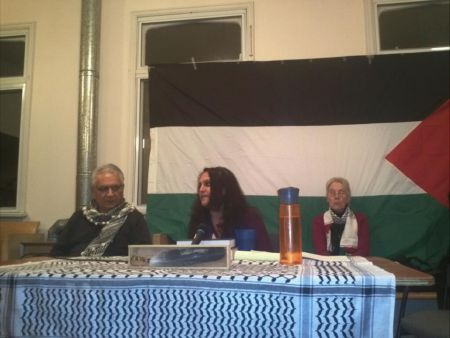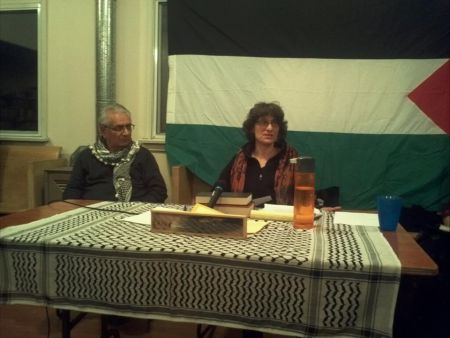This post has not been reviewed by the Vancouver Media Co-op editorial committee.
STORY about Peace/Warpublié le Novembre 22, 2011 by clkates
Shifting the Discourse: Vancouver marks International Day of Solidarity with the Palestinian People
Also posted by clkates:
Also in Peace/War:
Supporters of Palestine gathered in the Quaker Meeting House in Vancouver on Saturday, November 19, 2011, to mark the International Day of Solidarity with the Palestinian People. The Canada Palestine Association's annual event featured keynote speaker Dr. Nada Elia, a professor at Antioch University in Seattle and an Organizing Committee member of the US Campaign for the Academic and Cultural Boycott of Israel. Dr. Sunera Thobani, professor of Women's and Gender Studies at the University of British Columbia, also spoke at the event.
Hanna Kawas, chair of the Canada Palestine Association, opened the event by saluting the native people of the land, displaying a feather he had been presented as a visa to this land by indigenous activists. "It is this visa that is the only visa that gives us legitimacy and welcomes us here," said Kawas. He proceeded to discuss the history of the International Day of Solidarity, and how it emerged from the anniversary of the partition of Palestine by the United Nations on November 29, 1947. The Day was insitituted as a recognition decades later of the international crime that had been committed against the Palestinian people.
Marion Kawas spoke about CPA's ongoing campaigns in support of Palestine, including boycott campaigns, awareness raising actions and events, and the Voice of Palestine radio program that airs every Tuesday on Vancouver's community radio station, Co-Op Radio.
"Canadians have to support the Palestinian struggle, because Canadians have to be accountable for their government's support of Israel - even more so than the U.S.," said Sunera Thobani, who discussed the relationship between Canada and the Palestinian struggle. She decried the Americanization of Canadian foreign policy, and the Israelization of Canadian security policy, citing the Vancouver International Airport's retention of an Israeli security advisor to train airport staff, and the implications of these policies within Canada.
Thobani emphasized that solidarity with Palestine in Canada is a "question of accountability," saying that "Palestine is at the front lines of the Western imperialist project" and noting also that "Palestinian activists are at the forefront of developing strategies that movements elsewhere can learn from - particularly in Canada." She discussed the campaign to hold war criminals, such as Tzipi Livni, Ehud Barak, and Moshe Yaalon legally accountable in international courts, drawing comparisons to recent attempts to arrest Dick Cheney and George Bush in their visits to the Vancouver area, and introduced Nada Elia to discuss another of those Palestinian strategies: the boycott, divestment and sanctions (BDS) movement.
Elia recalled the history of the boycott movement targeting apartheid South Africa, noting that while it is often associated with the 1980s, boycott preparations began two decades prior. In comparison, she said, the Palestinian call for BDS was rapidly accelerated, achieving remarkable progress in only five years. "One of our main successes," she said, "has been to shift the discourse around who is the oppresser and who is the oppressed. People no longer view Israel as the victim of Palestinians...We are the ones who are naming and shaming Israel, rather than the other way around."
Elia echoed Thobani's earlier remarks about police militarization and Israelization, noting that the Seattle Police Department uses training videos made in Israel, with all their racialized context and content, in its own training. She recalled the Seattle Police Department's pattern of brutality, stating that "They are trigger happy, and they are trained by Israel."
She discussed BDS victories and achievements around the world, including the cancellation of a number of cultural performers' concerts in Israel, including the Gorillaz, Roger Waters, the Pixies, Annie Lennox, Gil Scott Heron, and Elvis Costello; Veolia's loss of contracts due to its involvement in Israeli occupation; Agrexco's liquidation; and Norway's pension fund's divestment from Elbit; among others. She also addressed the challenges to BDS, including the external challenges of state power and legal repression, such as the anti-boycott legislation passed in Israel and under consideration in the US. BDS also faces internal challenges, said Elia, including the Palestinian Authority's lack of legitimacy as a representative or voice of the Palestinian people inside and outside Palestine; "our leadership does not represent us."
She emphasized the complicity of Israeli academic institutions with the occupation, noting the role of the Technion and Ben Gurion University as centres of military research and development, and urged work around academic boycott. Elia's closing words were a note of hope and conviction that Palestine would see freedom and victory - and that BDS has a substantial role to play in ushering that day forward.
The evening concluded with words from Karen DeVito, Vancouver activist recently returned from her attempt on the Tahrir, the Canadian Boat to Gaza, to break the siege on Gaza as part of the Freedom Waves Flotilla. DeVito discussed her experience in Israeli detention and urged attention to the struggle of Palestinian political prisoners, who live in much worse circumstances daily. Emphasizing the commitment of the Flotilla organizers to continue their efforts, she noted that "we will go back, we will keep sailing, until Gaza - and Palestine - are free!"
Catch the news as it breaks: follow the VMC on Twitter.
Join the Vancouver Media Co-op today. Click here to learn about the benefits of membership.
The site for the Vancouver local of The Media Co-op has been archived and will no longer be updated. Please visit the main Media Co-op website to learn more about the organization.




